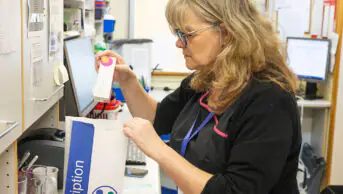
Shutterstock.com
Just over one-third (34%) of adult social care providers said medicines support from community pharmacy had improved over the past 12 months, according to results from a survey commissioned by the Care Quality Commission (CQC), the independent regulator of health and adult social care in England.
However, just over one in ten (13%) providers said that the support had got worse over the past year: citing issues with medicines shortages, medicines delivery and staff availability.
The survey, results of which were published on 14 August 2024, was carried out by Ipsos and completed by 2,331 care providers, including care homes, domiciliary care providers, extra care housing services and community-based services.
According to the results, adult social care providers typically received advice from community pharmacy on medicines side effects, over-the-counter medicines and safe medicines administration.
The majority of respondents said the support provided by community pharmacy met their needs, whether ‘fully’ (49%) or ‘to some extent’ (39%).
Care providers in London were most likely to say they felt the support ‘fully met’ their needs, with 61% of respondents agreeing.
Respondents also mostly agreed that the support they received to monitor and review medicines errors met their needs, with 66% saying it met their needs ‘fully’ and 28% saying their needs were met ‘to some extent’.
More than half (59%) agreed that support around medicines governance and audit ‘fully’ met their needs, with a further 33% saying it met their needs ‘to some extent’.
Those who responded to the survey saying that their needs were not being fully met by community pharmacy highlighted the following issues: difficulties and delays with medication (including delivery and shortages); communication and availability of community pharmacy staff; and challenges around administration and training provided.
Tase Oputu, chair of the Royal Pharmaceutical Society English Pharmacy Board, commented: “Pharmacy teams are working under significant pressure from high demand and ongoing medicines shortages, like other parts of the healthcare service. They are committed to supporting adult social care providers to ensure safe and effective use of medicines for vulnerable people.
“Pharmacies are an essential component of healthcare delivery for the communities they serve. The survey highlights the need for sustained government investment in funding and digital infrastructure to adequately support the sector in its continued delivery of outstanding care and medicines advice to patients and their carers.”
The Pharmaceutical Journal’s 2024 salary and job satisfaction survey revealed that 68% of pharmacist respondents answered ‘Yes’ when asked if medicines shortages have put patients at risk “in the past six months” — a 14 percentage point increase compared to the 2022 survey, to which 54% of pharmacists answered ‘Yes’ to the same question.


